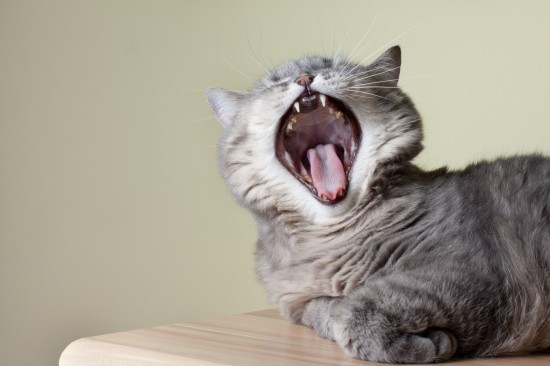
Pet insurance should cover the financial cost of your cat's behavioural problems. Although it is normal for cats, especially young ones, to be full of energy, if your cat appears to be in distress, there could be a serious cause.
Feline Hyperesthesia Syndrome (FHS) is a frightening condition but as some of the symptoms overlap with the normal erratic behaviour of kittens, it can be difficult to diagnose. If your pet's behaviour is more disturbing than amusing, a visit to the vet is advisable and should be covered by your pet insurance.
Whilst FHS usually has a physical cause, in some cases it can be a behavioural problem. Whether the cause of your pet's distress is medical or psychological, your pet insurance should be able to help with the costs.
Symptoms:
Feline Hyperesthesia Syndrome (FHS) is commonly known as rippling skin disorder. Often, when felines are suffering from this syndrome, the skin on their lower back visibly ripples.
Erratic running is another symptom of FHS. With 47% of the UK population owning a pet, most of us are probably familiar with the slightly crazy behaviour of kittens. Most young cats run around in circles, or race off in one direction before suddenly dashing the other way but unlike healthy kittens, cats with FHS are actually in distress.
If your cat has FHS their pupils may also dilate and their eyes could glass over giving them a frenzied look. Other symptoms include an extreme reluctance to be stroked and persistent mewing during the night.
Causes:
Physical causes can include the consumption of cleaning products and the use of toxic flea dips or dubious flea collars. Exposure to toxins is probably one of the first things your vet will try to rule out.
Fleabites can also be blamed for a lot of erratic behaviour in cats. Tolerating the incessant itchiness, especially if they suffer from flea allergies, can be maddening. This potential problem should be easy for your vet to spot.
If your cat has an excess of unsaturated fatty acids and a lack of vitamin E in their diet they can develop Pansteatitis, which is another possible cause. If they are having seizures, your vet may also want to investigate the possibility of brain infections and tumours.
Once these potential causes have been ruled out, FSH may be diagnosed as an Obsessive Compulsive Disorder or a stress related condition.
Whether your vet suggests a course of treatment that is medical or psychological, your pet insurance should cover the cost. Most reputable pet insurance policies will even pay for the specialist treatment of behavioural problems if your vet makes a recommendation. With expert care, your cat should be back to their old self in no time.
About John Lewis Insurance:
Since Greenbee launched four years ago, we've provided insurance with the same high standards of service and value for money that you'd expect from John Lewis, so we've decided to change our name to John Lewis Insurance. As we evolve, we'll continue to offer our customers exceptional products and service.
 Training The Alaskan Malamute Successfully
Training The Alaskan Malamute Successfully
 Is There Such A Thing As An Odourless Dog?
Is There Such A Thing As An Odourless Dog?
 Why you should bring your pet dog to a dog daycare Toronto at least once?
Why you should bring your pet dog to a dog daycare Toronto at least once?
 All About Reptile Brumation
All About Reptile Brumation
 Why Does My Cat Have Bad Breath ? The Five Top Reasons
Why Does My Cat Have Bad Breath ? The Five Top Reasons
 Can Two Un-neutered Male Dogs Live Happily Together Without Fighting?
Can Two Un-neutered Male Dogs Live Happily Together Without Fighting?
 Is It Ok To Feed Bones To Dogs?
Is It Ok To Feed
Is It Ok To Feed Bones To Dogs?
Is It Ok To Feed
 Build the Chicken Houses Like It Is Your Very Own
Build the Chicken Houses Like It Is Your Very Own
Build the Chicken Houses Like It Is Your Very Own
Build the Chicken Houses Like It Is Your Very Own
 The Best Tarantula Breeds For Beginners
The Best Tarantul
The Best Tarantula Breeds For Beginners
The Best Tarantul
 Importance of Giving Your Dog the Best Food and Caring
Importance of Giving Your Dog the Best Food and Caring
Importance of Giving Your Dog the Best Food and Caring
Importance of Giving Your Dog the Best Food and Caring
 Schutzhund Training Explained
Schutzhund Traini
Schutzhund Training Explained
Schutzhund Traini
Copyright © 2005-2016 Pet Information All Rights Reserved
Contact us: www162date@outlook.com